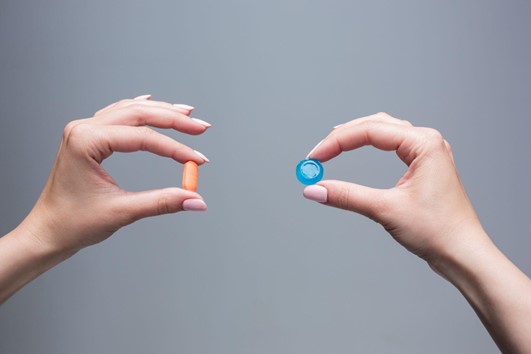Last updated on December 26th, 2024 at 03:34 pm

Difference Between Generic and Branded Medicine -In pharmaceuticals, generic and branded medicines stand out, offering varied treatment options. While effective, they diverge in composition, development, pricing, and market presence. Understanding these differences empowers both healthcare professionals and consumers to make informed treatment decisions.
Generic Medicine vs Branded Medicine
Branded medicines, also known as innovator or originator drugs, are pharmaceutical products developed and marketed by pharmaceutical companies after extensive research, development, and clinical trials.
These medications are the initial versions of a particular drug introduced into the market and are protected by patents, which grant the manufacturer exclusive rights to produce and sell the drug for a specific period (usually almost 20 years). Branded drugs are often the result of years of scientific research and innovation.
Generic medicines are equivalent alternatives to branded drugs that become available once the patent protection for the original branded drug expires.
Generic drugs contain the same active ingredients, strength, dosage form, and intended use as the branded drug. However, they may have minor differences in inactive ingredients (such as fillers and binders) and appearance due to variations in manufacturing processes.
Difference between generic and branded medicine
The primary differences between generic and branded medicine are as follows in tabular form:
| Aspect | Generic Medicines | Branded Medicines |
| Composition | Same active ingredients as a branded drug; may have different inactive ingredients | Developed by pharmaceutical companies after extensive research, development, and clinical trials |
| Pricing | More affordable due to lower development costs | Often more expensive due to R&D, clinical trials, and marketing |
| Regulatory Approval | Required to demonstrate bioequivalence to branded drug | Undergo rigorous clinical trials and regulatory approval process before being marketed |
| Patent Protection | Not protected by patents | Protected by patents, granting exclusivity for a certain period |
| Appearance | May look different in terms of packaging and colour, but have the same therapeutic effect | Often recognizable due to specific packaging, colour, and branding |
| Brand Recognition | Lack of unique branding and packaging | Distinct brand name, logo, and appearance |
| Manufacturer’s Choice | Manufacturers can produce generic versions after patent expiration | The original manufacturer retains exclusive production rights |
| Interchangeability | Can often be used interchangeably with branded drugs under supervision | May need a healthcare professional’s approval before switching |
Also Read: Difference Between Generic and Branded Medicine in Hindi
Characteristics of Branded Medicines
- Research and Development: Pharmaceutical companies invest significant resources in research and development (R&D) to discover and develop new medications. This involves identifying potential drug candidates, conducting preclinical studies, and carrying out clinical trials to assess safety and efficacy.
- Clinical Trials: Before a branded drug can be approved for use, it undergoes a series of clinical trials involving human participants. These trials follow a rigorous protocol to evaluate the drug’s safety, effectiveness, dosages, and potential side effects.
- Patent Protection: Upon successful clinical trials and regulatory approval, the pharmaceutical company is granted a patent that provides exclusive rights to manufacture and market the drug for a specified period. This exclusivity helps companies recoup the substantial costs associated with R&D and clinical testing.
- Higher Costs: The costs incurred during the research, development, clinical trials, and marketing of branded drugs contribute to their higher pricing. Patients often pay more for branded medications to cover the expenses invested in bringing these drugs to the market.
- Brand Recognition: Branded drugs are associated with specific names, packaging, and sometimes even colours. The branding helps distinguish the drug in the market and aids patients in identifying their prescribed medication.

Characteristics of Generic Medicines
- Bioequivalence: Generic drugs must demonstrate bioequivalence to the branded drug, indicating they perform in the body similarly to the original. Regulatory agencies mandate that generic drugs show equal absorption rates and extents as the branded drug.
- Regulatory Approval: Generic drugs undergo a regulatory approval process that involves demonstrating their bioequivalence and safety through studies and testing. Because the efficacy of the active ingredient has already been established by the original drug, the approval process for generic drugs is generally less extensive than that for branded drugs.
- Affordability: One of the main advantages of generic drugs is their lower cost compared to branded drugs. Since generic manufacturers do not need to invest in extensive research and development, their production costs are lower, leading to more affordable pricing for consumers.
- Interchangeability: In many cases, generic drugs can be used interchangeably with branded drugs under the supervision of a healthcare professional. However, in some cases, patients might need to consult their doctors before switching between the two.
- Packaging and Appearance: While generic drugs must have the same active ingredients as the branded drug, they might look different due to variations in packaging and colour. However, these differences do not affect the drug’s therapeutic effects.
Also Read: What is Generic Medicine?
Conclusion:
The primary differences between generic and branded medicines lie in their composition, pricing, development process, and marketing. While branded medications are the result of extensive research and development and often come at a higher cost, generic medicines offer a more affordable alternative with equivalent therapeutic effects.
Patients should consult their healthcare providers before switching between generic and branded medications to ensure that their treatment remains effective and safe.
> Consult a Doctor and Medkart will help you Order Medicines Online
FAQs on the Difference Between Generic and Branded Medicine
Q1. What is the main difference between generic and branded medicines?
The primary difference between generic and branded medicines lies in their development and pricing. Pharmaceutical companies develop branded medicines through extensive research, clinical trials, and innovation, protecting them with patents and resulting in higher costs. On the other hand, generic medicines are equivalent alternatives to branded drugs, available after the patent protection expires. They have the same active ingredients and intended use as the branded drug but are more affordable due to lower development costs.
Q2. Are generic medicines as effective as branded ones?
Yes, generic medicines are required to be bioequivalent to the branded drug. This means they contain the same active ingredients in the same dosage form, strength, and route of administration as the original drug. Regulatory agencies ensure that generic drugs perform similarly in the body and produce the same therapeutic effects.
Q3. Why are branded medicines more expensive than generics?
Branded medicines incur substantial costs in research, development, clinical trials, and marketing efforts. Pharmaceutical companies invest in these aspects to bring innovative treatments to the market. The high price of branded drugs helps manufacturers recover these costs during the exclusivity period granted by patents. In contrast, generic drugs come to call after the patent protection has expired, and their manufacturers do not have the same development expenses.
Q4. Can I switch from a branded medication to its generic counterpart?
In many cases, patients can often switch safely from branded to generic drugs with healthcare professional approval. Generic drugs, being bioequivalent to branded ones, should offer comparable therapeutic effects. Consulting your healthcare provider before altering medication ensures safety and effectiveness, given individual variability.
Related Links:
